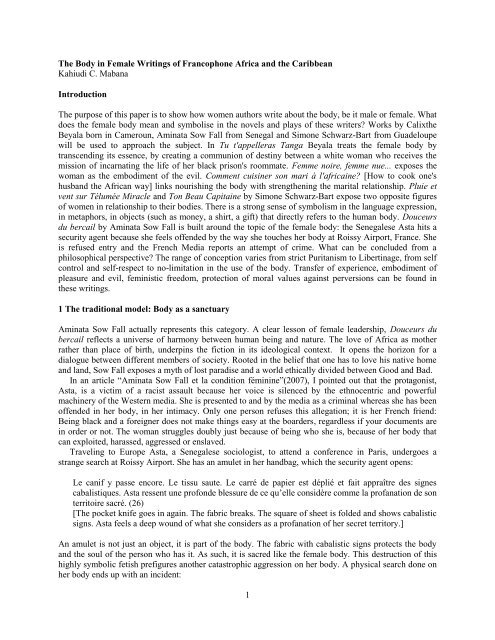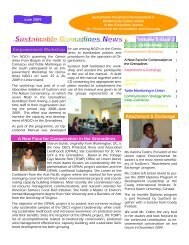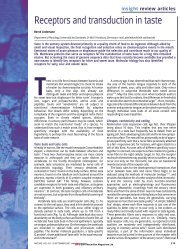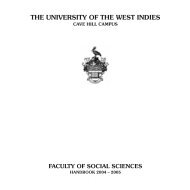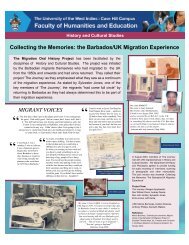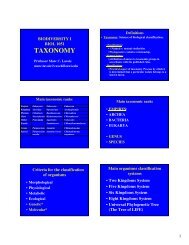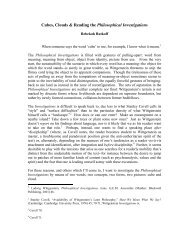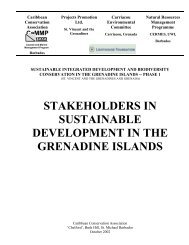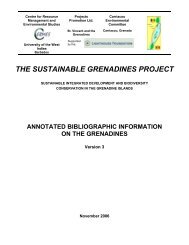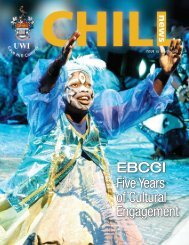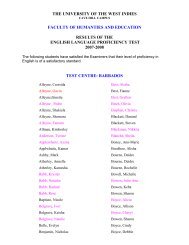1 The Body in Female Writings of Francophone Africa and the ...
1 The Body in Female Writings of Francophone Africa and the ...
1 The Body in Female Writings of Francophone Africa and the ...
You also want an ePaper? Increase the reach of your titles
YUMPU automatically turns print PDFs into web optimized ePapers that Google loves.
<strong>The</strong> <strong>Body</strong> <strong>in</strong> <strong>Female</strong> Writ<strong>in</strong>gs <strong>of</strong> <strong>Francophone</strong> <strong>Africa</strong> <strong>and</strong> <strong>the</strong> Caribbean<br />
Kahiudi C. Mabana<br />
Introduction<br />
<strong>The</strong> purpose <strong>of</strong> this paper is to show how women authors write about <strong>the</strong> body, be it male or female. What<br />
does <strong>the</strong> female body mean <strong>and</strong> symbolise <strong>in</strong> <strong>the</strong> novels <strong>and</strong> plays <strong>of</strong> <strong>the</strong>se writers? Works by Calix<strong>the</strong><br />
Beyala born <strong>in</strong> Cameroun, Am<strong>in</strong>ata Sow Fall from Senegal <strong>and</strong> Simone Schwarz-Bart from Guadeloupe<br />
will be used to approach <strong>the</strong> subject. In Tu t'appelleras Tanga Beyala treats <strong>the</strong> female body by<br />
transcend<strong>in</strong>g its essence, by creat<strong>in</strong>g a communion <strong>of</strong> dest<strong>in</strong>y between a white woman who receives <strong>the</strong><br />
mission <strong>of</strong> <strong>in</strong>carnat<strong>in</strong>g <strong>the</strong> life <strong>of</strong> her black prison's roommate. Femme noire, femme nue... exposes <strong>the</strong><br />
woman as <strong>the</strong> embodiment <strong>of</strong> <strong>the</strong> evil. Comment cuis<strong>in</strong>er son mari à l'africa<strong>in</strong>e? [How to cook one's<br />
husb<strong>and</strong> <strong>the</strong> <strong>Africa</strong>n way] l<strong>in</strong>ks nourish<strong>in</strong>g <strong>the</strong> body with streng<strong>the</strong>n<strong>in</strong>g <strong>the</strong> marital relationship. Pluie et<br />
vent sur Télumée Miracle <strong>and</strong> Ton Beau Capita<strong>in</strong>e by Simone Schwarz-Bart expose two opposite figures<br />
<strong>of</strong> women <strong>in</strong> relationship to <strong>the</strong>ir bodies. <strong>The</strong>re is a strong sense <strong>of</strong> symbolism <strong>in</strong> <strong>the</strong> language expression,<br />
<strong>in</strong> metaphors, <strong>in</strong> objects (such as money, a shirt, a gift) that directly refers to <strong>the</strong> human body. Douceurs<br />
du bercail by Am<strong>in</strong>ata Sow Fall is built around <strong>the</strong> topic <strong>of</strong> <strong>the</strong> female body: <strong>the</strong> Senegalese Asta hits a<br />
security agent because she feels <strong>of</strong>fended by <strong>the</strong> way she touches her body at Roissy Airport, France. She<br />
is refused entry <strong>and</strong> <strong>the</strong> French Media reports an attempt <strong>of</strong> crime. What can be concluded from a<br />
philosophical perspective? <strong>The</strong> range <strong>of</strong> conception varies from strict Puritanism to Libert<strong>in</strong>age, from self<br />
control <strong>and</strong> self-respect to no-limitation <strong>in</strong> <strong>the</strong> use <strong>of</strong> <strong>the</strong> body. Transfer <strong>of</strong> experience, embodiment <strong>of</strong><br />
pleasure <strong>and</strong> evil, fem<strong>in</strong>istic freedom, protection <strong>of</strong> moral values aga<strong>in</strong>st perversions can be found <strong>in</strong><br />
<strong>the</strong>se writ<strong>in</strong>gs.<br />
1 <strong>The</strong> traditional model: <strong>Body</strong> as a sanctuary<br />
Am<strong>in</strong>ata Sow Fall actually represents this category. A clear lesson <strong>of</strong> female leadership, Douceurs du<br />
bercail reflects a universe <strong>of</strong> harmony between human be<strong>in</strong>g <strong>and</strong> nature. <strong>The</strong> love <strong>of</strong> <strong>Africa</strong> as mo<strong>the</strong>r<br />
ra<strong>the</strong>r than place <strong>of</strong> birth, underp<strong>in</strong>s <strong>the</strong> fiction <strong>in</strong> its ideological context. It opens <strong>the</strong> horizon for a<br />
dialogue between different members <strong>of</strong> society. Rooted <strong>in</strong> <strong>the</strong> belief that one has to love his native home<br />
<strong>and</strong> l<strong>and</strong>, Sow Fall exposes a myth <strong>of</strong> lost paradise <strong>and</strong> a world ethically divided between Good <strong>and</strong> Bad.<br />
In an article “Am<strong>in</strong>ata Sow Fall et la condition fém<strong>in</strong><strong>in</strong>e”(2007), I po<strong>in</strong>ted out that <strong>the</strong> protagonist,<br />
Asta, is a victim <strong>of</strong> a racist assault because her voice is silenced by <strong>the</strong> ethnocentric <strong>and</strong> powerful<br />
mach<strong>in</strong>ery <strong>of</strong> <strong>the</strong> Western media. She is presented to <strong>and</strong> by <strong>the</strong> media as a crim<strong>in</strong>al whereas she has been<br />
<strong>of</strong>fended <strong>in</strong> her body, <strong>in</strong> her <strong>in</strong>timacy. Only one person refuses this allegation; it is her French friend:<br />
Be<strong>in</strong>g black <strong>and</strong> a foreigner does not make th<strong>in</strong>gs easy at <strong>the</strong> boarders, regardless if your documents are<br />
<strong>in</strong> order or not. <strong>The</strong> woman struggles doubly just because <strong>of</strong> be<strong>in</strong>g who she is, because <strong>of</strong> her body that<br />
can exploited, harassed, aggressed or enslaved.<br />
Travel<strong>in</strong>g to Europe Asta, a Senegalese sociologist, to attend a conference <strong>in</strong> Paris, undergoes a<br />
strange search at Roissy Airport. She has an amulet <strong>in</strong> her h<strong>and</strong>bag, which <strong>the</strong> security agent opens:<br />
Le canif y passe encore. Le tissu saute. Le carré de papier est déplié et fait appraître des signes<br />
cabalistiques. Asta ressent une pr<strong>of</strong>onde blessure de ce qu’elle considère comme la pr<strong>of</strong>anation de son<br />
territoire sacré. (26)<br />
[<strong>The</strong> pocket knife goes <strong>in</strong> aga<strong>in</strong>. <strong>The</strong> fabric breaks. <strong>The</strong> square <strong>of</strong> sheet is folded <strong>and</strong> shows cabalistic<br />
signs. Asta feels a deep wound <strong>of</strong> what she considers as a pr<strong>of</strong>anation <strong>of</strong> her secret territory.]<br />
An amulet is not just an object, it is part <strong>of</strong> <strong>the</strong> body. <strong>The</strong> fabric with cabalistic signs protects <strong>the</strong> body<br />
<strong>and</strong> <strong>the</strong> soul <strong>of</strong> <strong>the</strong> person who has it. As such, it is sacred like <strong>the</strong> female body. This destruction <strong>of</strong> this<br />
highly symbolic fetish prefigures ano<strong>the</strong>r catastrophic aggression on her body. A physical search done on<br />
her body ends up with an <strong>in</strong>cident:<br />
1
Asta a accepté d’enlever sa veste, ses chaussures et ses bas. Elle refuse d’ôter le reste. Des ma<strong>in</strong>s<br />
gantées lui balaient toutes les parties du corps, passent sous le soutien-gorge, descendant<br />
jusqu’aux genoux, remontent sous la jupe. Asta frissonne de dégoût. Elle a le sentiment qu’on la<br />
brise. Les ma<strong>in</strong>s montent. […] Asta sert la jambe. La ma<strong>in</strong> <strong>in</strong>siste, elle a de la vigueur et,<br />
sûrement, de l’expérience. Asta ne veut pas être va<strong>in</strong>cue. Elle sursaute. « Jamais ! » se dit-elle.<br />
Une rage bestiale la saisit. Elle voudrait hurler sa colère mais ne peut émettre aucun son. Ses deux<br />
ma<strong>in</strong>s, comme les crocs d’un automate, se ferment brusquement sur le cou de son vis-à-vis. Asta<br />
s’y agrippe de toutes ses forces, les dents serrées, et n’entend même pas le cri déchirant qui attire<br />
une meute de policiers. (27-28).<br />
[Asta has accepted to remove her jacket, her shoes <strong>and</strong> her stock<strong>in</strong>gs. She refuses to remove <strong>the</strong><br />
rest. Gloved h<strong>and</strong>s sweep up all her body’s parts, go under <strong>the</strong> bra, go down to <strong>the</strong> knees, come<br />
up back under <strong>the</strong> skirt. Asta shivers <strong>of</strong> disgust. She has <strong>the</strong> feel<strong>in</strong>g that she is be<strong>in</strong>g broken. <strong>The</strong><br />
h<strong>and</strong>s go back up. […] Asta tightens her legs. <strong>The</strong> h<strong>and</strong> <strong>in</strong>sists, it has some vigour <strong>and</strong>, surely,<br />
experience. Asta does not want to surrender. […] A bestial rage takes her. She would like to shout<br />
her anger but cannot give out a sound. Both her h<strong>and</strong>s, like <strong>the</strong> hooks <strong>of</strong> an automaton, squeeze<br />
briskly on <strong>the</strong> neck <strong>of</strong> her counterpart. Asta catches with all her strengths, clenched teeth, <strong>and</strong><br />
does not even hear <strong>the</strong> heart-rend<strong>in</strong>g shout which attracts a pack <strong>of</strong> policemen.]”<br />
Asta is arrested because she has assault an agent, but nobody states that she has protected her body, her<br />
sacred body from pr<strong>of</strong>anation. By outrageously touch<strong>in</strong>g her <strong>in</strong>timate parts, <strong>the</strong> female security agent<br />
takes advantage <strong>of</strong> her dom<strong>in</strong>at<strong>in</strong>g position to violate Asta’s <strong>in</strong>timacy, leav<strong>in</strong>g her with no o<strong>the</strong>r<br />
alternative but to defend herself. <strong>The</strong>refore, she is arrested without be<strong>in</strong>g heard, silenced to death, because<br />
she is nobody <strong>and</strong> has no rights. Worse, she is sent back to Senegal <strong>in</strong> a charter like a crim<strong>in</strong>al. All this<br />
humiliation occurs because she has defended her body.<br />
After this humiliation Asta is conv<strong>in</strong>ced that <strong>Africa</strong>ns do not need to move to Europe or <strong>the</strong> West, that<br />
<strong>Africa</strong> is <strong>the</strong> best home for <strong>Africa</strong>ns, she builds a Teranga village with some friends, where <strong>the</strong>y wish to<br />
live <strong>in</strong> peace, underst<strong>and</strong><strong>in</strong>g <strong>and</strong> mutual support. In that village life is so rooted <strong>in</strong> <strong>the</strong> <strong>Africa</strong>n tradition<br />
that <strong>the</strong> marital relationship is conceived accord<strong>in</strong>g to <strong>the</strong> traditional way as exemplified by Dianor, a<br />
bl<strong>in</strong>d man, <strong>and</strong> his wife B<strong>in</strong>eta. Actually Dianor has become bl<strong>in</strong>d follow<strong>in</strong>g a snake’s poison attack:<br />
- Je t’avais dit que je ne suis pas aveugle, n’est-ce pas…<br />
- Je sais bien que tu n’es pas aveugle.<br />
- […]<br />
- Tu crois que je n’ai pas remarqué un peu plus de coquetterie, un peu plus de so<strong>in</strong>s ?<br />
- Hiii ! B<strong>in</strong>eta est passée par là !<br />
- Est-ce que B<strong>in</strong>eta n’est pas celle par qui je peux voir le monde ?<br />
- Mais si, mais si !<br />
- Tu crois que je n’ai pas remarqué la manière dont Babou te regarde ? (222-223)<br />
- [I told you that I am not bl<strong>in</strong>d, didn't I.<br />
- I do know that you are not bl<strong>in</strong>d.<br />
- [...]<br />
- You th<strong>in</strong>k that I have not noticed a little more coquetry, a little more cares?<br />
- Hiii! B<strong>in</strong>eta has gone through <strong>the</strong>re.<br />
- Is B<strong>in</strong>eta not <strong>the</strong> one through whom I can see <strong>the</strong> world?<br />
- Right! Right!<br />
- Do you th<strong>in</strong>k I have not noticed <strong>the</strong> way Babou looks at you?]<br />
2
That man can proudly that his wife is his “eyes”. <strong>The</strong> absent eyes or <strong>the</strong> absence <strong>of</strong> vision is replaced by<br />
<strong>the</strong> perception <strong>of</strong> <strong>the</strong> o<strong>the</strong>r. Dianor sees through <strong>the</strong> eyes <strong>of</strong> B<strong>in</strong>eta. Both <strong>of</strong> <strong>the</strong>m form a wonderful<br />
couple, discreet accomplices <strong>in</strong> <strong>the</strong> fulfilment <strong>of</strong> <strong>the</strong>ir marital commitments.<br />
On <strong>the</strong> o<strong>the</strong>r h<strong>and</strong> <strong>the</strong>re is <strong>in</strong> Douceurs du bercail a severe critique <strong>of</strong> <strong>the</strong> new society, especially <strong>of</strong><br />
<strong>the</strong> youth <strong>in</strong> connexion with <strong>the</strong>ir carelessness <strong>and</strong> neglect <strong>of</strong> self-respect. Urban life opens to excesses.<br />
Pik<strong>in</strong>e Tougal, a hot-red area <strong>of</strong> Dakar, <strong>in</strong>carnates <strong>the</strong> Bad, <strong>the</strong> s<strong>in</strong>, immorality <strong>and</strong> uncontrolled freedom<br />
<strong>of</strong> customs. It is a place especially dedicated to pleasures <strong>of</strong> music, dance, alcohol, food, sex, life. A place<br />
<strong>of</strong> extravaganza! As an illustration <strong>of</strong> excess, a girl named Câl<strong>in</strong>e has sex not with one but with a group <strong>of</strong><br />
teen mates:<br />
[…] éméchée au sortir d’une boîte de nuit, elle avait laissé faire une b<strong>and</strong>e de jeunes gens, sur le<br />
banc d’un jard<strong>in</strong> public et avait a<strong>in</strong>si « ramassé » une grossesse ; elle avait voulu la garder pour<br />
coir comment c’était d’être maman, puisqu’elle-même n’avait jamais connu sa mère qui l’avait<br />
ab<strong>and</strong>onnée sur le parvis d’une église (157)<br />
[Câl<strong>in</strong>e: tipsy com<strong>in</strong>g out <strong>of</strong> a night club, she had <strong>of</strong>fered her body to a group <strong>of</strong> young people,<br />
on a bench <strong>of</strong> a public garden <strong>and</strong> she had thus "collected" a pregnancy; she had wanted to keep it<br />
to see how it looked out to be a mo<strong>the</strong>r, because herself had never known her mo<strong>the</strong>r who had<br />
ab<strong>and</strong>oned her <strong>in</strong> front <strong>of</strong> a church.]<br />
Câl<strong>in</strong>e decides not to term<strong>in</strong>ate pregnancy <strong>and</strong> to keep <strong>the</strong> unborn baby just <strong>in</strong> order to experience<br />
mo<strong>the</strong>rhood, to fulfil <strong>the</strong> absence <strong>of</strong> <strong>the</strong> mo<strong>the</strong>r she never knew. As a matter <strong>of</strong> fact, she has no guide to<br />
advise her. Lost or totally immersed <strong>in</strong> <strong>the</strong> chaotic world, she is <strong>the</strong> perfect female character empowered<br />
by fem<strong>in</strong>ist ideologies. Her body is hers; she treats it as it pleases her, nobody controls her voice <strong>and</strong> her<br />
body. No power, no authority, just herself with her fate. <strong>The</strong> same can be said <strong>of</strong> Fabala with her<br />
irresponsible mo<strong>the</strong>rhood: “Trois enfants sans père, n’est-ce pas une double calamite! Le pire est qu’elle<br />
s’en fout…” [Three children without fa<strong>the</strong>r, it’s a double calamity, isn’t it? <strong>The</strong> worst is that she does not<br />
care…] By <strong>the</strong> way <strong>the</strong>y h<strong>and</strong>le <strong>the</strong>ir body, Câl<strong>in</strong>e <strong>and</strong> Fabala could easily act as typical female characters<br />
like <strong>the</strong> ones re-presented by Beyala, <strong>the</strong> only difference be<strong>in</strong>g that Beyala pushes <strong>the</strong> caricatured portrait<br />
to <strong>the</strong> extreme.<br />
2. "Writ<strong>in</strong>g under <strong>the</strong> sk<strong>in</strong>"<br />
2.1 Construction <strong>of</strong> a “hybrid” Fem<strong>in</strong><strong>in</strong>ity<br />
Beyala’s Your Name Shall Be Tanga (Tu t'appelleras Tanga) treats <strong>the</strong> female body by transcend<strong>in</strong>g its<br />
essence, by creat<strong>in</strong>g a communion <strong>of</strong> dest<strong>in</strong>y between a white woman who receives <strong>the</strong> mission <strong>of</strong><br />
<strong>in</strong>carnat<strong>in</strong>g <strong>the</strong> life <strong>of</strong> her black prison's roommate. Two prison cellmates, Tanga <strong>and</strong> Anna-Claude, jo<strong>in</strong><br />
<strong>in</strong> a pact: “I am go<strong>in</strong>g to die, woman. White people die as well, you know ? To dive <strong>in</strong>to death as you do<br />
<strong>in</strong>to life. Without a visa, without a passport” (1) “I am you, you are me, were are one” (1).<br />
Beyond <strong>the</strong> races, <strong>the</strong>re is a common dest<strong>in</strong>y for <strong>the</strong>se two women, marg<strong>in</strong>alised by <strong>the</strong>ir <strong>Africa</strong>n <strong>and</strong><br />
European societies <strong>in</strong> which <strong>the</strong> male still dom<strong>in</strong>ates <strong>and</strong> send <strong>the</strong>m <strong>in</strong> jail because <strong>of</strong> <strong>the</strong>ir irreducibility<br />
to <strong>the</strong> system. Tanga <strong>and</strong> Anna-Claude do not fit <strong>in</strong> those societies because <strong>the</strong>y are different from <strong>the</strong><br />
o<strong>the</strong>r. By build<strong>in</strong>g this pact, by putt<strong>in</strong>g toge<strong>the</strong>r <strong>the</strong>ir bodies, <strong>the</strong>y create a path for <strong>the</strong>ir survival <strong>in</strong> a<br />
corporal <strong>and</strong> surreal way:<br />
Here, <strong>the</strong> merg<strong>in</strong>g <strong>of</strong> diverse cultural elements does not necessarily signify an erasure <strong>of</strong> one<br />
culture or trait; ra<strong>the</strong>r all elements <strong>in</strong>volved <strong>in</strong> <strong>the</strong> assimilation process are transformed by <strong>the</strong><br />
encounter. In <strong>the</strong>ir shared cell, Tanga <strong>and</strong> Anna-Claude exist <strong>in</strong> a type <strong>of</strong> “border zone,” removed<br />
from <strong>the</strong>ir unique cultural contexts. ( Westmorel<strong>and</strong> Bouchard, 65)<br />
3
2.2.1 <strong>The</strong> paranoiac Anna-Claude:<br />
A former pr<strong>of</strong>essor <strong>of</strong> philosophy <strong>in</strong> a French gymnasium, Anna-Claude does not fit at all <strong>in</strong> <strong>the</strong> school<br />
hierarchy. Delirious, crazy <strong>and</strong> totally <strong>in</strong>sane, she lives <strong>in</strong> ano<strong>the</strong>r world, she looks like somebody without<br />
any roots at her work place.<br />
When <strong>the</strong> time for class arrived, she’d go to meet her students aga<strong>in</strong>, with haggard eyes und<br />
unkempt hair. She’d sit on top <strong>of</strong> <strong>the</strong> front desk, with her chest pushed out, <strong>and</strong> she’d speak.<br />
Decisive, hard, mysterious. A teacher <strong>of</strong> philosophy, who would sacrifice Hegel <strong>and</strong> Kant to<br />
occult sciences. She’d endlessly affirm that <strong>the</strong> meet<strong>in</strong>g po<strong>in</strong>t <strong>of</strong> <strong>the</strong> world lay <strong>in</strong> <strong>the</strong> imag<strong>in</strong>ary<br />
<strong>and</strong> that it would suffice to close one’s eyes, to listen to one’s own vibrations to reach it. (2-3)<br />
In her m<strong>in</strong>d, <strong>the</strong>re is no limit between myth <strong>and</strong> reality, between dream <strong>and</strong> what actually happens around<br />
her. Conv<strong>in</strong>ced that she lived <strong>in</strong> <strong>Africa</strong> <strong>in</strong> a previous life, she start a quest for her <strong>Africa</strong>n identity. Her<br />
merg<strong>in</strong>g with Tanga somehow constitutes <strong>the</strong> fulfilment <strong>of</strong> a mad dream. And <strong>the</strong> dream is materialised<br />
by a spectral be<strong>in</strong>g, a ghost who will complete all her desires <strong>and</strong> her empt<strong>in</strong>ess. This confusion makes<br />
her fly <strong>in</strong> her imag<strong>in</strong>ary, so that she embarks <strong>in</strong> a quest for Ousmane, <strong>the</strong> male embodiment <strong>of</strong> all her<br />
deepest desires:<br />
Anna-Claude ! For <strong>the</strong> time be<strong>in</strong>g, she’d <strong>in</strong>vented her man. Fashioned to fit her dreams. She<br />
called him Ousmane. He was h<strong>and</strong>some, he was tall, he was smart. He lived <strong>in</strong> <strong>Africa</strong> where he<br />
was build<strong>in</strong>g bridges <strong>and</strong> roads <strong>and</strong> soon he’d be return<strong>in</strong>g to her <strong>in</strong> <strong>the</strong>ir Paris apartment. In her<br />
visions she imag<strong>in</strong>ed him. (3).<br />
Ousmane is not just a creation <strong>of</strong> her “folie” but <strong>the</strong> ma<strong>in</strong> reason for her life, <strong>the</strong> aim <strong>of</strong> everyth<strong>in</strong>g she has<br />
been long<strong>in</strong>g for s<strong>in</strong>ce she was born. <strong>The</strong> illusion even goes fur<strong>the</strong>r.<br />
To <strong>the</strong> men who accosted her <strong>in</strong> <strong>the</strong> street, on metro platforms, she’d say : "I am married ; I’m<br />
expect<strong>in</strong>g a baby." <strong>The</strong>y’d <strong>in</strong>sist, she’d persist. She’s add ano<strong>the</strong>r piece to this or that rickety<br />
detail, polish<strong>in</strong>g it up. She’d ended up by sculpt<strong>in</strong>g her sex <strong>in</strong> marble. (3-4).<br />
Not belong<strong>in</strong>g to France any more, she opts to move to In<strong>in</strong>gué, Ousmane’s birthplace <strong>and</strong> obta<strong>in</strong>s a<br />
teach<strong>in</strong>g position <strong>in</strong> <strong>the</strong> imag<strong>in</strong>ary former French colony. She is arrested because she participates <strong>in</strong> a<br />
march aga<strong>in</strong>st <strong>the</strong> public power, a male dom<strong>in</strong>ated society.<br />
2.2.2 “Ru<strong>in</strong>ed” Tanga:<br />
Tanga’s life has an irretrievable lack s<strong>in</strong>ce she feels an unfilled hole, empt<strong>in</strong>ess <strong>in</strong> her body. As Lynne<br />
Nottage would state, she is “ru<strong>in</strong>ed” because she once for all carries a shame <strong>in</strong> her body. She resists <strong>the</strong><br />
state by try<strong>in</strong>g to overcome <strong>the</strong> situation. A shame <strong>in</strong>carnated by her mo<strong>the</strong>r. Rebellious, she never<br />
forgets <strong>the</strong> harm <strong>of</strong> her mutilation. Her mo<strong>the</strong>r made <strong>the</strong> mistake – although it is just usual tradition – to<br />
sacrifice her to <strong>the</strong> clitoris snatcher’s altar:<br />
I can see her still, my mo<strong>the</strong>r old one, shimmer<strong>in</strong>g <strong>in</strong> her immaculate kaba, a black scarf <strong>in</strong> her<br />
hair, cry<strong>in</strong>g out to every god: ‘She has become a woman, she has become a woman. With that’, as<br />
she taps her beh<strong>in</strong>d, ‘she’ll keep any man.’ I didn’t weep. I didn’t say a th<strong>in</strong>g. I fell heir to <strong>the</strong><br />
blood between my legs. To a hole between my thighs. All that I was left with was <strong>the</strong> law <strong>of</strong><br />
oblivion. Time passed, I was becom<strong>in</strong>g accustomed to that part <strong>of</strong> me that was gone. I kidnapped<br />
<strong>the</strong> horde <strong>of</strong> memories. I tied <strong>the</strong>m up with str<strong>in</strong>g. (12)<br />
4
<strong>The</strong> practice <strong>of</strong> excision, that is highly spread throughout many countries <strong>of</strong> <strong>Africa</strong>, rema<strong>in</strong>s debatable. A<br />
girl does not become a woman unless she is excised. In recent times, voices have been raised aga<strong>in</strong>st this<br />
dangerous <strong>and</strong> unfair practice but <strong>the</strong> mentality is still so strong that anyone liv<strong>in</strong>g <strong>in</strong> that environment<br />
cannot escape it. Tanga courageously faces this “empt<strong>in</strong>ess” left by this mutilation. That is <strong>the</strong> equivalent<br />
<strong>of</strong> circumcision for <strong>the</strong> male counterpart, <strong>the</strong> rape performed by her fa<strong>the</strong>r when she was twelve digs<br />
ano<strong>the</strong>r <strong>in</strong>curable hole.. She keeps vigorously observ<strong>in</strong>g her fa<strong>the</strong>r old one’s comm<strong>and</strong>: “Don’t forget, a<br />
child must keep its eyes lowered’. What I was left with were legs.” […] I was scrut<strong>in</strong>is<strong>in</strong>g legs, noth<strong>in</strong>g<br />
but legs. Weak. Flabby. Shapeless. All <strong>of</strong> <strong>the</strong>m revealed vices <strong>and</strong> shameful maladies” (9). It is also how<br />
she f<strong>in</strong>ally ends up meet<strong>in</strong>g Hassan, <strong>the</strong> man <strong>of</strong> her life as long as a prostitute can enjoy a love story or a<br />
true relationship.<br />
I met Hassan through his legs. I can see <strong>the</strong>m still, grey trousers fitt<strong>in</strong>g <strong>the</strong>m like a glove,<br />
crumpled around his penis <strong>and</strong> his belly. Black shoes. Yellow socks. […] Hassan’s legs. I see<br />
<strong>the</strong>m parade before me. <strong>The</strong>y move ahead straight <strong>in</strong> my l<strong>in</strong>e <strong>of</strong> vision ; <strong>the</strong>y’re lay<strong>in</strong>g <strong>the</strong> egg <strong>of</strong><br />
desire <strong>in</strong> my body. (10)<br />
<strong>The</strong> only two words he has spoken are enough to mark me, to take <strong>the</strong> husk <strong>of</strong>f any amorous<br />
embrace <strong>in</strong> which I <strong>of</strong>fer my body to feed <strong>the</strong> family. I refuse <strong>the</strong> costume which he wants me to<br />
put on my back. (12)<br />
She is naturally bound to be a prostitute. Prostitution here is not a choice but an unavoidable option to<br />
feed her family. Giv<strong>in</strong>g her body to a man just for <strong>the</strong> purpose <strong>of</strong> survival is rebell<strong>in</strong>g, but not a will<strong>in</strong>g<br />
decision by Tanga. She is a victim <strong>of</strong> a male oriented community, which she opposes. Sent to prison, she<br />
is about to die when she th<strong>in</strong>ks to transfer her story to Anna-Claude. <strong>The</strong> transmission <strong>of</strong> <strong>the</strong> voice works<br />
through a symbolic <strong>and</strong> ritual body merg<strong>in</strong>g.<br />
3. <strong>The</strong> Fragmented <strong>Body</strong> as a symbol <strong>of</strong> a dest<strong>in</strong>y<br />
3.1 <strong>The</strong> Indomitable Woman <strong>in</strong> Pluie et vent sur Télumée Miracle<br />
In this part, I would like to look at <strong>the</strong> body as a set <strong>of</strong> different parts which constitute <strong>the</strong> whole.<br />
Interest<strong>in</strong>gly, every part constitutes <strong>the</strong> whole. <strong>The</strong>re is a metonymic relationship between <strong>the</strong> body <strong>and</strong><br />
its components. <strong>The</strong> heart means <strong>the</strong> entire human body, like <strong>the</strong> eyes, <strong>the</strong> nose, <strong>the</strong> legs as well. <strong>The</strong><br />
heart <strong>in</strong>cludes <strong>the</strong> m<strong>in</strong>d <strong>of</strong> <strong>the</strong> person who possesses it. <strong>The</strong> fragmented body functions as a paradigm <strong>of</strong><br />
dest<strong>in</strong>y, especially <strong>in</strong> <strong>the</strong> Caribbean where women had to construct <strong>the</strong>ir fem<strong>in</strong><strong>in</strong>ity follow<strong>in</strong>g <strong>the</strong><br />
abolition <strong>of</strong> slavery. Novel female protagonists such as Télumé Miracle <strong>in</strong> Simone Schwarz-Bart’s <strong>The</strong><br />
Bridge <strong>of</strong> Beyond <strong>and</strong> Marie-Sophie Laborieux <strong>in</strong> Patrick Chamoiseau’s Texaco show <strong>the</strong>ir perseverance<br />
<strong>and</strong> spirit <strong>of</strong> resistance to adversities. And still <strong>the</strong> body rema<strong>in</strong>s <strong>the</strong> central reference <strong>in</strong> <strong>the</strong>se novels.<br />
<strong>The</strong> open<strong>in</strong>g <strong>of</strong> <strong>The</strong> Bridge <strong>of</strong> Beyond is <strong>in</strong>structive, because it sets <strong>the</strong> read<strong>in</strong>g hermeneutics as wished<br />
by <strong>the</strong> writer:<br />
A man's country may be cramped or vast accord<strong>in</strong>g on <strong>the</strong> size <strong>of</strong> his heart. I've never found my<br />
country too small, though that isn't to say that my heart is great. And if I could choose, it's here <strong>in</strong><br />
Guadeloupe that I'd be born aga<strong>in</strong>, suffer <strong>and</strong> die. (2)<br />
<strong>The</strong> stance shows <strong>the</strong> affirmation <strong>the</strong> "I" as a body <strong>in</strong> a space, a heart that can <strong>in</strong>fluence <strong>the</strong> vision <strong>of</strong><br />
nature <strong>and</strong> self. <strong>The</strong> narrator expresses a fond love for her country <strong>and</strong> makes a clear statement. <strong>The</strong><br />
open<strong>in</strong>g symbiotically prefigures <strong>the</strong> narrative <strong>in</strong> its totality, a deep implant<strong>in</strong>g <strong>in</strong> a custom <strong>and</strong> a world<br />
view po<strong>in</strong>t. <strong>The</strong> story told by Telumée is about a woman, Touss<strong>in</strong>e, who will later become Queen<br />
5
Without a Name. She is a very special woman, courageous, strictly attached to very simple pr<strong>in</strong>ciples <strong>of</strong><br />
life <strong>and</strong> ethics.<br />
Mama was a woman who carried her head high on a slender neck. Her eyes, always half shut,<br />
seemed to be asleep, dream<strong>in</strong>g <strong>in</strong> <strong>the</strong> shade <strong>of</strong> <strong>the</strong>ir thick lashes. […] No one <strong>in</strong> L'Ab<strong>and</strong>onnée<br />
noticed her beauty, for her sk<strong>in</strong> was very dark; it was only after my fa<strong>the</strong>r set eyes on her that<br />
everyone else did <strong>the</strong> same. (17)<br />
This praise <strong>of</strong> <strong>the</strong> female beauty reveals a secretive l<strong>in</strong>k between Mama <strong>and</strong> <strong>the</strong> place, L’Ab<strong>and</strong>onnée<br />
[<strong>The</strong> Ab<strong>and</strong>oned]. It suggests that Mama used to behave discreetly before she got married. <strong>The</strong> darkness<br />
<strong>of</strong> her sk<strong>in</strong> came to light <strong>and</strong> shone through <strong>the</strong> eyes <strong>of</strong> <strong>the</strong> narrator’s fa<strong>the</strong>r. In o<strong>the</strong>r words, her body was<br />
hidden, dest<strong>in</strong>ed to be discovered by <strong>the</strong> right man <strong>of</strong> her dreams. Fur<strong>the</strong>rmore, <strong>the</strong> eyes <strong>of</strong> <strong>the</strong> husb<strong>and</strong><br />
over <strong>the</strong> woman’s beauty brought <strong>the</strong> latter to existence not only as a body, but more as a wife <strong>and</strong><br />
mo<strong>the</strong>r. After <strong>the</strong> pass<strong>in</strong>g <strong>of</strong> her beloved one, she transferred her love <strong>and</strong> her life <strong>in</strong> <strong>the</strong> h<strong>and</strong>s <strong>of</strong> her<br />
daughter:<br />
She was only wait<strong>in</strong>g for me to pour forth <strong>the</strong> last floods <strong>of</strong> her sadness, to revive <strong>the</strong> gleam <strong>in</strong><br />
her worn-out eyes. […] She lived for me, she brea<strong>the</strong>d through my mouth. When I was away she<br />
would get <strong>in</strong>to a state <strong>of</strong> agitation that only ended with my return. (41)<br />
She m<strong>in</strong>gled with her daughter. <strong>The</strong> relationship mo<strong>the</strong>r-daughter constitutes <strong>the</strong> po<strong>in</strong>t <strong>of</strong> life <strong>and</strong> survival<br />
for <strong>the</strong> older woman. <strong>The</strong>y are so narrowly united that <strong>the</strong>y share every vital organs. <strong>The</strong>ir completeness<br />
is so strong that any breach would create disappo<strong>in</strong>tment, dysfunction <strong>in</strong> <strong>the</strong>ir life. When Jeremias falls <strong>in</strong><br />
love with Télumée <strong>and</strong> starts his unfaithful behaviour, Mama recounts <strong>the</strong>m a tale based on body's parts:<br />
At that time, when <strong>the</strong> devil was still a little boy <strong>the</strong>re lived <strong>in</strong> Fond-Zombi a man called Wvabor<br />
Longlegs, a f<strong>in</strong>e fellow <strong>the</strong> colour <strong>of</strong> burnt sienna, with long s<strong>in</strong>ewy limbs <strong>and</strong> greenish hair that<br />
everyone envied. <strong>The</strong> more he saw <strong>of</strong> men <strong>the</strong> more perverse he found <strong>the</strong>m, <strong>and</strong> <strong>the</strong> wickedness<br />
he saw <strong>in</strong> <strong>the</strong>m prevented him from admir<strong>in</strong>g anyth<strong>in</strong>g whatever. […] but on all that he looked<br />
with disgust. <strong>The</strong> only company that pleased him was that <strong>of</strong> his mare, which he's named My<br />
Two Eyes. He loved <strong>the</strong> mare above all else, <strong>and</strong> would let her do anyth<strong>in</strong>g; she sat <strong>in</strong> his rock<strong>in</strong>g<br />
chair, pranced over his carpets, <strong>and</strong> ate out <strong>of</strong> a silver manger. (49)<br />
One day […] he mounted <strong>and</strong> rode away. Great pa<strong>in</strong> was <strong>in</strong> him, he was wretched, <strong>and</strong> let <strong>the</strong><br />
horse carry him where it willed. […] One day, as he was rid<strong>in</strong>g about like this, he saw a woman<br />
with serene eyes, loved her, <strong>and</strong> tried to dismount. But it was too late. <strong>The</strong> mare started to wh<strong>in</strong>ny<br />
<strong>and</strong> kick, <strong>and</strong> bolted <strong>of</strong>f with him far, far away from <strong>the</strong> woman, at a frantic gallop he couldn't<br />
stop. <strong>The</strong> animal had become his master. (50)<br />
This tale illustrates that one needs a balance <strong>in</strong> life. <strong>The</strong> myth <strong>of</strong> <strong>the</strong> unbelievable, <strong>the</strong> hyperbolic<br />
qualities, <strong>of</strong>ten ends with disillusion. Wvabor Longlegs is unable to fulfil his love to a woman because he<br />
is already engaged to his mare he names My Eyes. <strong>The</strong> mare <strong>in</strong>carnat<strong>in</strong>g actually <strong>the</strong> wife cannot allow<br />
<strong>the</strong> presence <strong>of</strong> a woman around her beloved one. <strong>The</strong> tale metaphorically shows <strong>the</strong> irreducible harmony<br />
<strong>in</strong> <strong>the</strong> function<strong>in</strong>g <strong>of</strong> <strong>the</strong> human body as a set <strong>of</strong> different parts. So to say, <strong>the</strong>re is no place for a woman <strong>in</strong><br />
<strong>the</strong> heart <strong>of</strong> a man who displaces <strong>the</strong> object <strong>of</strong> his love on an animal; as <strong>the</strong> legs only go where <strong>the</strong> eyes<br />
guide <strong>the</strong>m. “<strong>The</strong> animal has become his master” is a direct consequence <strong>of</strong> <strong>the</strong> man’s behaviour. And <strong>the</strong><br />
mare <strong>in</strong>carnates <strong>the</strong> fatal woman. At <strong>the</strong> deepest structural level, <strong>the</strong> tale conta<strong>in</strong>s erotic suggestions:<br />
longlegs, my eyes, “he mounted”, all <strong>the</strong>se words suggest <strong>in</strong> <strong>the</strong> end erotic connotations. <strong>The</strong> body-rooted<br />
tale def<strong>in</strong>itely teaches about be<strong>in</strong>g faithful <strong>and</strong> trustful.<br />
6
3.2 <strong>The</strong> Woman's Faithfulness <strong>in</strong> question <strong>in</strong> Ton Beau Capita<strong>in</strong>e<br />
Simone Schwarz-Bart’s play Your H<strong>and</strong>some Capta<strong>in</strong> is about a Haitian young man Wilnor Baptiste who<br />
moves to Guadeloupe <strong>in</strong> order to get a better job <strong>and</strong> life. He communicates by tape with his wife Marie-<br />
Ange left <strong>in</strong> Haiti. <strong>The</strong> play starts with Wilnor listen<strong>in</strong>g to a tape sent by his wife: “I kicked all my<br />
people out <strong>of</strong> <strong>the</strong> shack, <strong>in</strong>clud<strong>in</strong>g <strong>the</strong> roosters, <strong>and</strong> now we’re alonen you <strong>and</strong> me. You over <strong>the</strong>re <strong>and</strong> me<br />
<strong>the</strong>re, you here <strong>and</strong> me over <strong>the</strong>re. It’s all <strong>the</strong> same.” ( YHC 532) <strong>The</strong> tape allows proximity, quite a direct<br />
body contact between <strong>the</strong> two protagonists.<br />
Marie-Ange prepares her husb<strong>and</strong> to <strong>the</strong> embarrass<strong>in</strong>g event by portray<strong>in</strong>g negatively <strong>the</strong> young man<br />
who brought her <strong>the</strong> parcel <strong>of</strong> presents sent to her by Wilnor:<br />
And when I asked him [that young man] how you looked, at first he didn’t want to answer. <strong>The</strong>n<br />
he told me that you changed a lot, become sk<strong>in</strong>ny, melted like a c<strong>and</strong>le. That you looked like a<br />
little shrivelled up black man. Shriveled up outside <strong>and</strong> shrivelled-up <strong>in</strong>side. Shriveled-up,<br />
shriveled-up. (533).<br />
"Shriveled-up" here a specific phallus related connotation, it evokes mascul<strong>in</strong>ity, male reproductive<br />
element. Clearly, <strong>the</strong> description <strong>of</strong> Wilnor’s body given by <strong>the</strong> messenger constitutes a strategy for him<br />
to <strong>in</strong>fluence <strong>and</strong> seduce Marie-Ange. It works apparently, because she has a dream annihilat<strong>in</strong>g Wilnor’s<br />
body:<br />
And that same night I had a dream. First I saw myself at <strong>the</strong> river wash<strong>in</strong>g your flannel shirt; you<br />
know, <strong>the</strong> grey one with <strong>the</strong> red stripes, <strong>the</strong> pretty one. And suddenly I realize I’m wash<strong>in</strong>g your<br />
body, (Pause), your liv<strong>in</strong>g body. (Pause) You are all flat <strong>in</strong>side <strong>the</strong> shirt, Wilnor. Your head <strong>and</strong><br />
your h<strong>and</strong>s stick out; your legs, everyth<strong>in</strong>g, flat. Flat as a newspaper picture. You try to slip away<br />
<strong>and</strong> I want to hold you back – but you melt between my arms <strong>and</strong> soon <strong>the</strong>re is noth<strong>in</strong>g <strong>in</strong>side <strong>the</strong><br />
shirt. Wilnor, it’s empty… empty… (533)<br />
This dream goes fur<strong>the</strong>r than <strong>the</strong> messenger's description: <strong>the</strong> woman unconsciously causes Wilnor's<br />
mascul<strong>in</strong>ity to disappear. <strong>The</strong> lexical field made <strong>of</strong> cloth, body, flatness, melt<strong>in</strong>g confirms <strong>the</strong> process <strong>of</strong><br />
<strong>the</strong> body's decrepitude previously started by <strong>the</strong> messenger. It is an attempt <strong>of</strong> resistance by <strong>the</strong> woman to<br />
<strong>the</strong> messenger's discourse, <strong>and</strong> to hide her carelessness s<strong>in</strong>ce <strong>the</strong> "flannel shirt" symbolises Wilnor's<br />
presence <strong>and</strong> connects directly to his body. Los<strong>in</strong>g this vital connection through <strong>the</strong> melt<strong>in</strong>g <strong>of</strong> his body,<br />
i.e. him, allows <strong>the</strong>n Marie-Ange to tell <strong>the</strong> story <strong>of</strong> a lady <strong>of</strong> Port au Pr<strong>in</strong>ce whose husb<strong>and</strong> picks oranges<br />
<strong>in</strong> Florida:<br />
Suddenly, she is moved, so deeply moved on see<strong>in</strong>g <strong>the</strong> young man, she has <strong>the</strong> impression that<br />
he’s br<strong>in</strong>g her some <strong>of</strong> her husb<strong>and</strong>’s world, some <strong>of</strong> his scent. She looks at <strong>the</strong> eyes which has<br />
been <strong>the</strong> absent one. (She gives a small sob) She touches <strong>the</strong> h<strong>and</strong>s which just <strong>the</strong> day before, just<br />
yesterday, had touched <strong>the</strong> absent one. My God (She gives a small cry) f<strong>in</strong>ally, she’s completely<br />
confused (She sighs) <strong>and</strong> ends up <strong>in</strong> bed with <strong>the</strong> young man (She sobs.) But, <strong>in</strong> realty, it’s her<br />
husb<strong>and</strong>. (Pause) Seem<strong>in</strong>gly with <strong>the</strong> young man, but <strong>in</strong> reality ly<strong>in</strong>g by her husb<strong>and</strong>. (536)<br />
<strong>The</strong> scenario is <strong>the</strong> same like <strong>the</strong>ir scenario. She is <strong>in</strong> Haiti <strong>and</strong> he is <strong>in</strong> Guadeloupe work<strong>in</strong>g to ensure <strong>the</strong><br />
future <strong>of</strong> <strong>the</strong>ir common life. Act<strong>in</strong>g accord<strong>in</strong>g to a causality pr<strong>in</strong>ciple that <strong>the</strong> same causes have <strong>the</strong> same<br />
effects, Marie-Ange confesses her betrayal:<br />
That woman is me. [...] He joked exactly like you, Wilnor. <strong>The</strong> same way. And his eyes rem<strong>in</strong>ded<br />
me <strong>of</strong> your eyes. His h<strong>and</strong>s rem<strong>in</strong>ded me <strong>of</strong> your h<strong>and</strong>s. It was you I held <strong>in</strong> my arms. It was only<br />
you that I welcomed <strong>in</strong> my bed” (536)<br />
7
<strong>The</strong> first time that your good friend came was Wednesday, January 2 nd , St. Eustache’s day. I<br />
thought <strong>of</strong> you on see<strong>in</strong>g him <strong>and</strong> I gave <strong>in</strong> after he threatened not give me my money. He came<br />
back on Saturday, January 7th, <strong>and</strong> I thought <strong>of</strong> you aga<strong>in</strong>. <strong>The</strong>n I thought <strong>of</strong> you Monday,<br />
January 9 th […] (537)<br />
From <strong>the</strong> visual <strong>and</strong> physical similarities, from <strong>the</strong> desire to its fulfilment, <strong>the</strong> pace is quickly made. <strong>The</strong><br />
confusion is so powerful that <strong>the</strong> woman's m<strong>in</strong>d <strong>and</strong> body are brought to feel <strong>the</strong> same emotions as if <strong>the</strong><br />
husb<strong>and</strong> were present. <strong>The</strong> euphemised phrase “I thought <strong>of</strong> you” does not mean that she loves her<br />
husb<strong>and</strong>, but she has an extramarital love affair.<br />
When Wilnor answers, he does not blame her but he sarcastically affirms his mascul<strong>in</strong>ity, by<br />
lexicaliz<strong>in</strong>g <strong>the</strong> same phrase <strong>and</strong> alter<strong>in</strong>g it: ""S<strong>in</strong>ce arriv<strong>in</strong>g <strong>in</strong> Guadeloupe, I've thought about you a<br />
great deal” (538). <strong>The</strong> thought which is equivalent to m<strong>in</strong>d becomes, by transposition, equivalent to a<br />
reciprocal confession as if he ironically takes a smart pleasure to contend his own unfaithfulness to Marie-<br />
Ange: “With all <strong>the</strong>se beautiful black women <strong>in</strong> ruffles <strong>and</strong> flounces <strong>and</strong> all <strong>of</strong> <strong>the</strong>se jazzy mulattoes<br />
buzz<strong>in</strong>g around you like mosquitoes from morn<strong>in</strong>g till night. Gorgeous, beautiful like <strong>the</strong> ra<strong>in</strong>bow, if you<br />
really want to know" (538). <strong>The</strong> appeal <strong>and</strong> <strong>the</strong> beauty <strong>of</strong> <strong>the</strong> female bodies are irresistible, especially<br />
when <strong>the</strong>ir “eyes” <strong>and</strong> scent transfigure <strong>the</strong> whole experience: “And <strong>the</strong>n I fell <strong>in</strong> <strong>the</strong> pit; I fell under <strong>the</strong><br />
spell just like you. <strong>The</strong>ir eyes rem<strong>in</strong>ded me <strong>of</strong> your eyes, <strong>the</strong>ir scent became your scent, do you<br />
underst<strong>and</strong> Marie-Ange? (538-39). He <strong>the</strong>n draws a conclusion: "A man's body cries for a woman's body,<br />
a woman's body cries out for a man's <strong>and</strong> that's what <strong>the</strong> Good Lord wishes" (539).<br />
<strong>The</strong> body <strong>in</strong>carnates all Marie-Ange’s desire, dream <strong>and</strong> reason <strong>of</strong> liv<strong>in</strong>g. Accord<strong>in</strong>g to <strong>the</strong> title <strong>of</strong> <strong>the</strong><br />
play, <strong>the</strong> l<strong>in</strong>guistic expression takes a metaphorical tone:<br />
Wilnor, I wish I were a boat sail<strong>in</strong>g to Guadeloupe. Once <strong>the</strong>re, you'd climb <strong>in</strong>side me, you'd<br />
walk on my deck, you'd place your h<strong>and</strong>s on my frame, you'd explore me from stem to stem. And<br />
you would set sail <strong>and</strong> I would take you t a country far, far, far away. (Pause) On <strong>the</strong> o<strong>the</strong>r side <strong>of</strong><br />
<strong>the</strong> world, perhaps where people don't look at you as though you were less than not<strong>in</strong>g, dried-out<br />
coconuts. [...] Wilnor, h<strong>and</strong>some capta<strong>in</strong> <strong>of</strong> my ship [...].... (534 ).<br />
<strong>The</strong> metaphor <strong>of</strong> <strong>the</strong> body becomes suggestive, imag<strong>in</strong>ative <strong>and</strong> visual. Marie-Ange would be <strong>the</strong> boat<br />
<strong>and</strong> Wilnor <strong>the</strong> h<strong>and</strong>some capta<strong>in</strong>. This dream however rema<strong>in</strong>s compromised by <strong>the</strong> weaknesses <strong>of</strong> <strong>the</strong><br />
same bodies <strong>in</strong>volved <strong>in</strong> <strong>the</strong> process. <strong>The</strong> change <strong>of</strong> dynamics has important implications for <strong>the</strong> male <strong>and</strong><br />
female concept <strong>of</strong> self. <strong>The</strong> female body as boat obviously reflects <strong>the</strong> tropical <strong>in</strong>sularity <strong>of</strong> <strong>the</strong> Caribbean.<br />
4. <strong>The</strong> Libert<strong>in</strong>e <strong>Body</strong><br />
4.1 <strong>The</strong> <strong>Body</strong> as food for man <strong>in</strong> Comment cuis<strong>in</strong>er son mari à l’africa<strong>in</strong>e?<br />
Calix<strong>the</strong> Beyala’s Comment cuis<strong>in</strong>er son mari à l’africa<strong>in</strong>e. [How to cook one's husb<strong>and</strong> <strong>the</strong> <strong>Africa</strong>n<br />
way?] l<strong>in</strong>ks nourish<strong>in</strong>g <strong>the</strong> body with streng<strong>the</strong>n<strong>in</strong>g <strong>the</strong> marital relationship. This is an amaz<strong>in</strong>g novel<br />
both for its orig<strong>in</strong>ality <strong>and</strong> for its triviality. <strong>The</strong> reader would expect a book entirely deal<strong>in</strong>g with cook<strong>in</strong>g<br />
recipes whereas it is ma<strong>in</strong>ly a narrative story <strong>in</strong>tercut by cul<strong>in</strong>ary recipes. It is at <strong>the</strong> same time a love<br />
story through <strong>the</strong> delight <strong>of</strong> food <strong>and</strong> w<strong>in</strong>e. In Paris, Aissatou a s<strong>in</strong>gle woman wants to seduce Bolobolo,<br />
her neighbour <strong>of</strong> <strong>the</strong> upper floor <strong>in</strong> <strong>the</strong> build<strong>in</strong>g occupied by people from diverse cultures. <strong>The</strong> latter lives<br />
with his old mo<strong>the</strong>r, whose best company is a hen. Westmorl<strong>and</strong> Bouchard notices a feature <strong>of</strong> Beyala’s<br />
poetics:<br />
Like her protagonists, Calix<strong>the</strong> Beyala is a complex, revolutionary storyteller who resists<br />
normative or imposed literary constructs. By push<strong>in</strong>g stylistic boundaries <strong>and</strong> challeng<strong>in</strong>g <strong>the</strong><br />
prescribed categorizations <strong>of</strong> both <strong>Africa</strong>n <strong>and</strong> European narratives, Beyala allows for a<br />
8
multiplicity <strong>of</strong> <strong>in</strong>dividual female voices to live on through her novels. (Westmorel<strong>and</strong> Bouchard<br />
66)<br />
Aissatou is presented as a black woman who has migrated to France, who repeatedly identifies herself as<br />
a white woman: « J’ignore qu<strong>and</strong> je suis devenue blanche » (12, 13). [I don't know when I became white].<br />
To achieve her <strong>in</strong>tegration to her new environment, she transforms her body by us<strong>in</strong>g products such as a<br />
“strong Sk<strong>in</strong> Success to remove roughcast <strong>of</strong>f her hair, Venus de Milo to lighten her sk<strong>in</strong>, <strong>and</strong> she opts for<br />
a slenderness diet.”(12). All <strong>the</strong>se changes on her body is to attract man’s sight. Like Tanga <strong>and</strong> Anna-<br />
Claude, she passionately longs for a man’s love <strong>and</strong> she tries whatever to attract Bolobolo:<br />
Souleymane Bolobolo – Malien et non baptisé sur les fonts – célibataire – manutentionnaire – vit<br />
avec sa mère qui a pour animal de compagnie une poule. Vous vous rendez compte ? Elle perd la<br />
tête, la pauvre ! (26)<br />
[Souleymane Bolobolo - Malian <strong>and</strong> not baptised - s<strong>in</strong>gle - a warehouseman - lives with his<br />
mo<strong>the</strong>r who has a hen as company animal. Do you realise that? She goes nuts, <strong>the</strong> poor.]<br />
<strong>The</strong> rhetorical question above suggests that Aissatou is <strong>the</strong> right solution to Bolobolo’s lonel<strong>in</strong>ess <strong>and</strong><br />
unhapp<strong>in</strong>ess. <strong>The</strong>refore she manages to meet him aga<strong>in</strong> at his door, pretend<strong>in</strong>g to be <strong>the</strong>re for ano<strong>the</strong>r<br />
reason. After discover<strong>in</strong>g that Bolobolo has a girlfriend, she consults a marabou: “ An <strong>Africa</strong>n woman<br />
without a marabou is like a navigator without compass” (43). An <strong>in</strong>terest<strong>in</strong>g scene takes place at<br />
Pr<strong>of</strong>essor Gombi's <strong>of</strong>fice. It is known that a woman usually goes to see a marabou for <strong>the</strong> purpose <strong>of</strong><br />
solv<strong>in</strong>g a love problem.<br />
- Qui d’entre nous peut prétendre ne pas être ici à cause d’un homme ?<br />
- Une menteuse ! crie une Négresse blonde.<br />
- Une sans-confiance ! Maïmouna, clame une Noire à la bouche si lippue qu’on pourrait en user<br />
comme d’un siège. Une sans-confiance et assass<strong>in</strong>e de l’épanouissement fém<strong>in</strong><strong>in</strong>.<br />
- Prends place, me propose Maïmouna. Il n’y a pas à avoir honte. (46)<br />
- [Who among you can pretend she is not here because <strong>of</strong> a man?<br />
- A liar! shouts a blond Negress<br />
- A without-confidence! Maimouna, claims a black with such a thick-lipped mouth that can be used<br />
as a seat. A without-confidence <strong>and</strong> murderer <strong>of</strong> <strong>the</strong> fem<strong>in</strong><strong>in</strong>e blossom<strong>in</strong>g.<br />
- Take a seat, tells me Maimouna. <strong>The</strong>re is no reason to be ashamed.] (46)<br />
Maïmouna criticises Aissatou's maigreur she juges contrary to <strong>Africa</strong>n/Black habits or canons <strong>of</strong> beauty:<br />
- Trop maigre, répète-t-elle. Qu’est-ce que tu veux qu’un homme mange là-dedans ? Les os, les<br />
arêtes ou quoi ? Des os, même un chien appartenant à un Blanc n’en veut pas ?<br />
- Qu’est-ce que c’est, ces bêtises ? (48)<br />
-<br />
- [Too th<strong>in</strong>, she repeats. What do you want a man can eat <strong>in</strong> it? Bones, fish bones or what? Bones,<br />
even a dog belong<strong>in</strong>g to a White man does not want it?<br />
- What's all this stupidity?] (48)<br />
<strong>The</strong>re are here two different op<strong>in</strong>ions about <strong>the</strong> woman body. <strong>The</strong> first one conceived <strong>the</strong> woman body as<br />
object <strong>of</strong> pleasure, food for a man. It is supposed that all her effort has to be made to fulfil <strong>the</strong><br />
expectations <strong>of</strong> a man. <strong>The</strong> obsequious woman conforms her attitudes to <strong>the</strong> rules set up for her by an<br />
established male-dom<strong>in</strong>ated or oriented society. <strong>The</strong> second op<strong>in</strong>ion (<strong>of</strong> Aissatou) firmly defends her<br />
freedom <strong>and</strong> rights. Liberated from <strong>the</strong> constra<strong>in</strong>ts <strong>of</strong> <strong>the</strong> <strong>Africa</strong>n social model, Aissatou adjusts herself to<br />
<strong>the</strong> modern fashion <strong>and</strong> Western canons <strong>of</strong> beauty. Maimouna rema<strong>in</strong>s fundamentally <strong>Africa</strong>n with<br />
9
egard to some life pr<strong>in</strong>ciples. Accord<strong>in</strong>g to her <strong>the</strong> secret <strong>of</strong> love is cook<strong>in</strong>g: "« cuis<strong>in</strong>er un homme avec<br />
un crocodile sauce meunière ou des gambas aux épices » (49) [cook<strong>in</strong>g a man with a crocodile meuniere<br />
sauce <strong>and</strong> spiced okra].<br />
Aissatou daily faces serious racist stereotypes <strong>in</strong> Comment cuis<strong>in</strong>er son mari à l'africa<strong>in</strong>e? although <strong>the</strong><br />
racial component was not relevant <strong>in</strong> Your Name Shall Be Tanga. It becomes central <strong>in</strong> <strong>the</strong> novel <strong>of</strong><br />
immigration <strong>and</strong> exile for <strong>the</strong> female narrator. When approached by a French gentleman who visibly<br />
wants to seduce her, <strong>the</strong> black woman replies aggressively:<br />
- Vous permettez ?<br />
- Je ne permets pas, dis-je, à cause de ses vila<strong>in</strong>es dents<br />
- Vous n’aimez pas les Blancs ?<br />
[...]. Il <strong>in</strong>siste :<br />
- Vous vous êtes trop habituée aux gros sexes des Noirs, si je comprends bien. (18).<br />
- [May I?<br />
- No, I don't allow, said I, because <strong>of</strong> his nasty teeth.<br />
- You don't like Whites?<br />
- [...]. He <strong>in</strong>sists :<br />
- You have too much accustomed to Blacks’ big sexes, if I underst<strong>and</strong> well.]<br />
Such a verbal exchange would have been censured some thirty years back because beside its <strong>in</strong>decency, it<br />
puts forward racial confrontations <strong>and</strong> racist clichés <strong>in</strong> <strong>the</strong> process. This is a typical discussion that<br />
Calix<strong>the</strong> Beyala freely, if not provocatively, <strong>of</strong>fers her readers. Her <strong>in</strong>tent apparently is to shock, to hurt<br />
<strong>the</strong> puritan m<strong>in</strong>d. Everyth<strong>in</strong>g is allowed, without restrictions. Very far from <strong>the</strong> traditional writ<strong>in</strong>g canons<br />
<strong>and</strong> styles, <strong>the</strong> aes<strong>the</strong>tics developed by <strong>the</strong> Cameroonian woman exceeds any rule, any restricted<br />
behaviour or reserved attitude. <strong>The</strong> prostitute, like any mad person <strong>in</strong> search for survival, is <strong>the</strong> paradigm<br />
<strong>of</strong> a prohibited discourse. <strong>The</strong> grotesque language, surpris<strong>in</strong>gly, forms part <strong>of</strong> her normal speech. <strong>The</strong><br />
concept <strong>of</strong> “normal” is displaced from <strong>the</strong> usual social practice towards an unknown but possible way <strong>of</strong><br />
apprehension.<br />
4.2 <strong>The</strong> praise <strong>of</strong> immorality <strong>in</strong> Femme noire, Femme nue<br />
Femme noire, femme nue... exposes <strong>the</strong> woman as <strong>the</strong> embodiment <strong>of</strong> <strong>the</strong> evil. This novel first <strong>of</strong> all<br />
disturbs for many reasons. C. Beyala is known for her outrageous publications; she always pushes fur<strong>the</strong>r<br />
her work <strong>of</strong> explor<strong>in</strong>g human defects with a clear <strong>in</strong>tent to trivialize <strong>the</strong>m. She likes to exploit prohibited<br />
topics through appeal<strong>in</strong>g titles <strong>and</strong> an expression that obviously transgresses <strong>the</strong> norms <strong>of</strong> <strong>the</strong> decent<br />
language. S<strong>in</strong>ce C’est le soleil qui m’a brûlée or Tu t’appelleras Tanga, go<strong>in</strong>g through Maman a un<br />
amant, <strong>the</strong> sensational goes along with <strong>the</strong> violation <strong>of</strong> social, moral <strong>and</strong> religious norms.<br />
Femme nue femme noire is openly about sex, a taboo subject formerly, <strong>in</strong>credible <strong>and</strong> immoral. Once<br />
aga<strong>in</strong>, Beyala exposes <strong>the</strong> slums <strong>of</strong> <strong>the</strong> poor society, exploited <strong>and</strong> disoriented by life me<strong>and</strong>ers. She<br />
shows <strong>the</strong> kleptomanie <strong>and</strong> <strong>the</strong> libid<strong>in</strong>ous lubricity <strong>of</strong> her narrator, <strong>the</strong> islamic praxis, different classes <strong>of</strong><br />
society <strong>and</strong> popular justice. From <strong>the</strong> open<strong>in</strong>g, <strong>the</strong> tone <strong>of</strong> <strong>the</strong> language, <strong>the</strong> <strong>in</strong>tention <strong>of</strong> <strong>the</strong> book, <strong>the</strong><br />
receiver <strong>of</strong> <strong>the</strong> purpose are clearly <strong>in</strong>dicated, <strong>and</strong> know<strong>in</strong>gly drawn by <strong>the</strong> homodiegetic narrator. <strong>The</strong><br />
story is formed <strong>of</strong> « des mots qui fessent, giflent, cassent et broient ! Que celui qui se sent mal à l’aise<br />
passe sa route… » [words that spank, slap, break <strong>and</strong> crush. If someone does fell well, he better goes on<br />
his way] (p. 11)<br />
Irène F<strong>of</strong>o is a thief <strong>and</strong> a prostitute. She steals <strong>in</strong> a morgue a bag conta<strong>in</strong><strong>in</strong>g <strong>the</strong> corpse <strong>of</strong> a dead baby<br />
<strong>and</strong> runs away, followed by a multitude <strong>of</strong> people. She manages to escape <strong>and</strong> get housed by a pious<br />
Muslim Ousmane <strong>and</strong> his wife Fatou. All <strong>of</strong> a sudden <strong>the</strong> house <strong>of</strong> her guests is transformed <strong>in</strong>to a bordel<br />
10
where people come to be healed <strong>of</strong> <strong>the</strong>ir sicknesses, even people get healed <strong>of</strong> <strong>the</strong>ir sicknesses <strong>and</strong><br />
h<strong>and</strong>icaps. Children, Jean-Baptiste <strong>and</strong> a couple Hayatou-Eva. Irène organizes collective orgies dur<strong>in</strong>g<br />
which some patients get healed from <strong>the</strong>ir chronicle sclerosis by call<strong>in</strong>g to m<strong>in</strong>d an old act <strong>of</strong> perversion<br />
or a homosexual scene. But when Irene leaves Ousmane's compounds, she is lynched by four men<br />
because <strong>of</strong> her previous crime.<br />
All <strong>the</strong> characters belong to <strong>the</strong> popular mass, poor <strong>and</strong> perverse although Irène is a daughter <strong>of</strong> a<br />
decent family <strong>in</strong> rebellion aga<strong>in</strong>st <strong>the</strong> conservatism <strong>of</strong> her dear ones. To tackle <strong>the</strong> urban misery she<br />
assigns herself as a mission to save <strong>the</strong> world by sex: " « Je suis une déesse capable de faire ce qu’a fait le<br />
Christ, mais en plus jouissif : guérir avec mon sexe » (p. 77) [I am a goddess able to do what Christ did,<br />
but <strong>in</strong> more brilliant: heal with my sex.] A veritable praise <strong>of</strong> <strong>the</strong> libido. <strong>The</strong> vicious Irene breaks taboos,<br />
reveals <strong>the</strong> hidden face <strong>of</strong> human be<strong>in</strong>gs, decreases <strong>the</strong> serious man, demystifies <strong>the</strong> sacred, <strong>and</strong><br />
transgresses all <strong>the</strong> noble traditions established forever. Every human be<strong>in</strong>g possesses a certa<strong>in</strong> extent <strong>of</strong><br />
perversion <strong>in</strong> him. She encourages Madele<strong>in</strong>e to go out with two lovers who are much younger than she<br />
is. <strong>The</strong> old lady would like to retrieve <strong>the</strong> lost time before dy<strong>in</strong>g. Hayatou who rediscovers his old vice<br />
sees his wife Eva taken by Jean-Baptiste, a young bisexual.<br />
Does <strong>the</strong> topic <strong>of</strong> madness, here a synonym <strong>of</strong> sexual obsession, not hide a deep critique <strong>of</strong> <strong>the</strong><br />
patriarchal society, a consideration <strong>of</strong> <strong>the</strong> op<strong>in</strong>ion <strong>in</strong> front <strong>of</strong> <strong>the</strong> real problems <strong>of</strong> this time? It is known<br />
that madness is a literary device for <strong>the</strong> writer to create for himself a space for a specific discourse: <strong>the</strong><br />
discourse <strong>of</strong> <strong>the</strong> unutterable. By so do<strong>in</strong>g <strong>the</strong> narrator deprave her language <strong>in</strong> order to elucidate <strong>the</strong> social<br />
collective frustration because <strong>the</strong> society is sick due to <strong>the</strong> numerous taboos around <strong>the</strong> sex. <strong>The</strong> narrative<br />
is deliberately obscene, <strong>in</strong>decent, grotesque. <strong>The</strong> detailed description <strong>of</strong> eccentricities consists despite <strong>of</strong><br />
its moral decl<strong>in</strong>e <strong>of</strong> a s<strong>in</strong>gular <strong>the</strong>rapy based on <strong>the</strong> liberation <strong>of</strong> <strong>the</strong> senses.<br />
Due to her experience, Irene <strong>in</strong>vites her patients to tell <strong>in</strong>terest<strong>in</strong>g stories <strong>in</strong> order to br<strong>in</strong>g <strong>the</strong>m to<br />
reveal <strong>the</strong> secret orig<strong>in</strong> <strong>of</strong> <strong>the</strong>ir frustration. Most <strong>of</strong> <strong>the</strong> time <strong>the</strong>re has been a rape, sodomy, sadism,<br />
masochism, relational perversion under <strong>the</strong> forms <strong>of</strong> ambiguous promiscuities <strong>and</strong> o<strong>the</strong>r irrational<br />
behaviours. <strong>The</strong>se breach <strong>in</strong> <strong>the</strong> conventional structures are emptied <strong>of</strong> defect, acquitted, even positively<br />
valorised. In <strong>the</strong> mise en scene with surreal contours, <strong>the</strong> <strong>the</strong>rapist steps aside to <strong>the</strong> benefit <strong>of</strong> <strong>the</strong> woman<br />
who plays <strong>the</strong> role <strong>of</strong> <strong>the</strong> prostitute or <strong>the</strong> foolish whereas <strong>the</strong> man retrieves his fundamental obsession.<br />
With a fem<strong>in</strong>ist realism which is particularly militant <strong>and</strong> aggressive, Beyala pa<strong>in</strong>ts a world <strong>in</strong><br />
foolishness, oppos<strong>in</strong>g any form <strong>of</strong> power. Because <strong>of</strong> sex, Beyala presents her protagonists sometimes as<br />
victims, sometimes as accomplices or manipulators <strong>of</strong> men. Religion contributes to subjugate <strong>the</strong> woman<br />
under <strong>the</strong> dom<strong>in</strong>ation <strong>of</strong> <strong>the</strong> man, as seen with <strong>the</strong> couple Ousmane-Fatou. Society, eroded by hypocrisy,<br />
is similar to an unconscious mass <strong>of</strong> <strong>the</strong> human dignity where <strong>the</strong> body <strong>of</strong> a baby can be put <strong>in</strong> a bag or<br />
stolen. In last analysis, Irène F<strong>of</strong>o, Fatou, Madele<strong>in</strong>e, Eva are just like <strong>the</strong>ir mascul<strong>in</strong>e counterparts -<br />
Ousmane, Hayatou, Jean-Baptiste - <strong>the</strong> last epigones <strong>of</strong> <strong>the</strong> worst specie <strong>of</strong> <strong>the</strong> vice.<br />
Such a novel, if it was a movie, would be classified as prohibited for children. It is tasteless, awful to<br />
read because <strong>of</strong> its language which is disrespectful, scatological <strong>and</strong> licentious, or because <strong>of</strong> its trivial<br />
<strong>and</strong> obscene style. To me Femme nue femme noire goes beyond <strong>the</strong> limits <strong>of</strong> pornography, sc<strong>and</strong>alizes<br />
because Beyala easily opts for vulgarity <strong>and</strong> vice which its narrator <strong>and</strong> protagonist praises. She<br />
dismantles all pr<strong>in</strong>ciples <strong>of</strong> common sense, love <strong>and</strong> marriage, by prostitut<strong>in</strong>g <strong>the</strong> widow <strong>and</strong> <strong>the</strong> married<br />
woman as well, by exalt<strong>in</strong>g homosexuality, by push<strong>in</strong>g to libert<strong>in</strong>age. Tak<strong>in</strong>g negritude from <strong>the</strong> bad part,<br />
<strong>the</strong> Cameroonian writer consciously develops a stereotype well known <strong>of</strong> a black woman, for <strong>the</strong>re are<br />
many readers - especially those qui affectionate sexual exoticism - who will appreciate her crude<br />
language. Is she not <strong>the</strong> female francophone writer presently most read?<br />
5. Marg<strong>in</strong>alization <strong>and</strong> Empowerment<br />
<strong>The</strong> cont<strong>in</strong>ental philosophy usually def<strong>in</strong>es body as <strong>the</strong> passive part <strong>of</strong> <strong>the</strong> human be<strong>in</strong>g. <strong>The</strong> body is <strong>the</strong><br />
centre <strong>of</strong> sensitivity, sufferance, dolour, emotion. As Lavelle states <strong>in</strong> La conscience de soi, he conscious<br />
Ego is not <strong>the</strong> one that is submitted to a more powerful force o<strong>the</strong>r than itself; it is <strong>the</strong> one that is active,<br />
11
that acts freely <strong>and</strong> responsibly. Ego is <strong>the</strong> product <strong>of</strong> itself. This can be applied to <strong>the</strong> woman’s situation<br />
as well. Her body marg<strong>in</strong>alises her <strong>and</strong> has to be empowered <strong>in</strong> order for her to become self. <strong>Female</strong><br />
writers by evok<strong>in</strong>g various women issues try to give <strong>the</strong>mselves a voice for <strong>the</strong>ir liberation. <strong>The</strong>refore<br />
depend<strong>in</strong>g on <strong>the</strong> writer’s temperament, <strong>the</strong> old order has to be changed smoothly, strongly, briskly, etc.<br />
For a very long time, <strong>the</strong> woman was not heard: she was strictly bound to be a housewife <strong>and</strong> a<br />
mo<strong>the</strong>r. Her role never went beyond <strong>the</strong> family circle. But <strong>the</strong> world has changed so much that her status<br />
has changed as well. <strong>The</strong> woman can do whatever a man can do; she can enjoy <strong>the</strong> same rights, freedom<br />
<strong>and</strong> access any job she wishes. Although <strong>the</strong> world vision has changed tremendously, women still<br />
struggle to get <strong>the</strong>ir rights acknowledged <strong>and</strong> <strong>the</strong> phallocratic order or male dom<strong>in</strong>ated society disappear.<br />
In <strong>Africa</strong>, <strong>the</strong> Caribbean <strong>and</strong> o<strong>the</strong>r parts <strong>of</strong> <strong>the</strong> world, female writers <strong>and</strong> o<strong>the</strong>r activities fight for total<br />
women emancipation, start<strong>in</strong>g from <strong>the</strong>ir body s<strong>in</strong>ce <strong>the</strong> female body is <strong>the</strong> visible part <strong>of</strong> <strong>the</strong>ir be<strong>in</strong>g. It is<br />
ma<strong>in</strong>ly about mak<strong>in</strong>g a female discourse effectively heard <strong>and</strong> accepted. In <strong>Francophone</strong> <strong>Africa</strong>n Women<br />
Writers: Destroy<strong>in</strong>g <strong>the</strong> Empt<strong>in</strong>ess <strong>of</strong> Silence, Irène Assiba D’Almeida writes:<br />
“Because <strong>of</strong> <strong>the</strong> hegemony <strong>of</strong> dom<strong>in</strong>ant discourses <strong>and</strong> socio-political structures with<strong>in</strong> <strong>and</strong><br />
outside <strong>Africa</strong>, <strong>Africa</strong>n women have ma<strong>in</strong>ly been represented as “o<strong>the</strong>r” <strong>and</strong> also as marg<strong>in</strong>al,<br />
silent, absent from <strong>the</strong> public sphere, conf<strong>in</strong>ed <strong>in</strong> private spaces. […] Yet as <strong>the</strong>y demonstrate,<br />
writ<strong>in</strong>g means empowerment <strong>and</strong> can serve to underm<strong>in</strong>e <strong>the</strong> marg<strong>in</strong>aliz<strong>in</strong>g project <strong>and</strong> move<br />
from marg<strong>in</strong> to center” (D’Almeida 22)<br />
<strong>The</strong> act <strong>of</strong> writ<strong>in</strong>g responds to <strong>the</strong> need, to <strong>the</strong> quest for liberation <strong>and</strong> self-creation. It implies rebellion<br />
aga<strong>in</strong>st <strong>the</strong> exist<strong>in</strong>g male-dom<strong>in</strong>ant order. Self-determ<strong>in</strong>ation, self-projection, self-made dest<strong>in</strong>ation, those<br />
are <strong>the</strong> terms <strong>of</strong> <strong>the</strong> new woman. <strong>The</strong> new woman is a concept born <strong>of</strong> struggle as Leonard Harris would<br />
have expressed it. Writ<strong>in</strong>g for women is a way <strong>of</strong> escap<strong>in</strong>g death, any k<strong>in</strong>d <strong>of</strong> condemnation to silence.<br />
<strong>The</strong> former subjugated gets <strong>the</strong> status <strong>of</strong> an act<strong>in</strong>g subject. From now on <strong>the</strong> woman takes control over her<br />
“self,” her dest<strong>in</strong>y, destroy<strong>in</strong>g <strong>the</strong> previous stronghold <strong>of</strong> <strong>the</strong> male counterpart. So to say, <strong>the</strong>re are various<br />
ways <strong>of</strong> be<strong>in</strong>g a female writer, as <strong>the</strong>re are many conceptions <strong>of</strong> <strong>the</strong> woman. In o<strong>the</strong>r terms <strong>and</strong> to some<br />
extend every woman is a fem<strong>in</strong><strong>in</strong>e writer <strong>in</strong> her way. Sow Fall, Schwarz-Bart, <strong>and</strong> Beyala represent<br />
different forms <strong>of</strong> fem<strong>in</strong><strong>in</strong>ity <strong>and</strong> fem<strong>in</strong>ism.<br />
<strong>The</strong> <strong>in</strong>tertw<strong>in</strong><strong>in</strong>g process observed <strong>in</strong> Your Name Shall Be Tanga constitutes a common attempt to<br />
recapture <strong>the</strong> mutilated <strong>and</strong> exploited woman’s body, a k<strong>in</strong>d <strong>of</strong> female universal effort to affirm <strong>the</strong>ir<br />
“self”. It is a process <strong>of</strong> ab<strong>and</strong>on<strong>in</strong>g <strong>the</strong> old order for <strong>the</strong> sake <strong>of</strong> <strong>the</strong> new one, to quit <strong>the</strong> form body for a<br />
new one, to embrace ano<strong>the</strong>r spirit <strong>in</strong> a symbiosis <strong>of</strong> body <strong>and</strong> m<strong>in</strong>d, <strong>in</strong> a fill<strong>in</strong>g <strong>the</strong> dy<strong>in</strong>g body with <strong>the</strong><br />
strength <strong>of</strong> a liv<strong>in</strong>g body under certa<strong>in</strong> conditions. <strong>The</strong> merg<strong>in</strong>g <strong>of</strong> <strong>the</strong> body implies putt<strong>in</strong>g toge<strong>the</strong>r m<strong>in</strong>d<br />
<strong>and</strong> dest<strong>in</strong>y, shar<strong>in</strong>g a common sense <strong>of</strong> life <strong>and</strong> reach<strong>in</strong>g a surreal degree <strong>of</strong> humanity:<br />
- Well <strong>the</strong>n, enter <strong>in</strong>to me. My secret will be illum<strong>in</strong>ated. But first, <strong>the</strong> white woman <strong>in</strong> you must<br />
die. Give me your h<strong>and</strong>; from now on you shall be me. You shall be seventeen seasons old; you<br />
shall be black; your name shall be Tanga. Come Tanga, give your h<strong>and</strong>, give it to me”<br />
- I’m frightened.<br />
- That word must die.<br />
- But…<br />
- Give me your h<strong>and</strong> <strong>and</strong> my story will be born <strong>in</strong> your ve<strong>in</strong>s. You’ll see how, <strong>in</strong> my country, a<br />
child is born old s<strong>in</strong>ce he cannot carry <strong>in</strong> fragrance on spr<strong>in</strong>gtime <strong>in</strong>side himself. How he has only<br />
his arms to give to <strong>the</strong> peanut fields” (7-8)<br />
<strong>The</strong> white woman is asked to become black by enter<strong>in</strong>g <strong>in</strong>to <strong>the</strong> black woman’s body. This unification<br />
process functions as a heal<strong>in</strong>g liturgy: Tanga can die bodily once she has someone to carry on her liv<strong>in</strong>g<br />
story <strong>and</strong> to take over her ideological discourse. This metaphysical relationship <strong>in</strong>cludes much more than<br />
just a mere transmission <strong>of</strong> a speech, a common attempt <strong>of</strong> survival. Time, race, sk<strong>in</strong> are somehow<br />
abolished by this corporal union <strong>of</strong> two be<strong>in</strong>gs <strong>in</strong> one, <strong>in</strong> one identity, <strong>in</strong> one body that can, <strong>the</strong>refore, be<br />
12
able to deliver <strong>the</strong> liberation message. As a result, <strong>the</strong> black woman gives up her story whereas <strong>the</strong> white<br />
gives up her sk<strong>in</strong> colour <strong>and</strong> becomes a legitimate heir <strong>of</strong> <strong>the</strong> black woman's sk<strong>in</strong>, speech <strong>and</strong> story. <strong>The</strong><br />
merg<strong>in</strong>g empowers <strong>the</strong> white woman to reach her own universal achievement. This confirms what Odile<br />
Cazenave has noted:<br />
Because <strong>the</strong>se women are marg<strong>in</strong>alized, or because <strong>the</strong>y have marg<strong>in</strong>alized <strong>the</strong>mselves, <strong>the</strong>y f<strong>in</strong>d<br />
<strong>the</strong>mselves <strong>in</strong> a paradoxically privileged position that allows <strong>the</strong>m to be <strong>in</strong>trospective <strong>and</strong> to<br />
conduct an elaborate analysis <strong>of</strong> society. This position also affords <strong>the</strong>m a fresh outlook not only<br />
on men but also on women, <strong>the</strong>ir parents, <strong>and</strong> <strong>the</strong>ir children. From this po<strong>in</strong>t, <strong>the</strong>y grant<br />
<strong>the</strong>mselves <strong>the</strong> means to move forward to a provocative exploration <strong>of</strong> areas that until now were<br />
ei<strong>the</strong>r declared <strong>of</strong>f limits or dismissed as trivial or marg<strong>in</strong>al. (Cazenave 12)<br />
From a philosophical po<strong>in</strong>t <strong>of</strong> view, this novel calls <strong>in</strong> question <strong>the</strong> concept <strong>of</strong> self <strong>and</strong> race <strong>in</strong> a very<br />
postcolonial context. <strong>The</strong> impossibility <strong>of</strong> melt<strong>in</strong>g <strong>in</strong> one pot does not annihilate <strong>the</strong> effort to keep one's<br />
<strong>in</strong>dividuality. In terms <strong>of</strong> cultural background, Anna-Claude jo<strong>in</strong>s her past by jo<strong>in</strong><strong>in</strong>g her orig<strong>in</strong>al black<br />
body she claims to have come from. <strong>The</strong> dest<strong>in</strong>y forces her to meet ano<strong>the</strong>r woman not a same-sex<br />
relationship but on a mythical, metaphysical <strong>and</strong> psychological symbiosis beyond any rational<br />
consideration or any <strong>in</strong>fluence <strong>of</strong> any controll<strong>in</strong>g authority. <strong>The</strong> new self that emerges from <strong>the</strong>ir<br />
<strong>in</strong>tertw<strong>in</strong><strong>in</strong>g process does not reflect any previous one; it destroys <strong>the</strong> convention <strong>of</strong> <strong>the</strong> traditional world.<br />
As Köhler notes, “<strong>the</strong> two women violate male order <strong>and</strong> mal economies <strong>in</strong> which <strong>the</strong> female body serves<br />
male (self-) constitution <strong>and</strong> male speech” (37).<br />
<strong>The</strong> same way, Mama lives through her daughter’s body <strong>in</strong> <strong>The</strong> Bridge <strong>of</strong> Beyond. Resist<strong>in</strong>g <strong>the</strong> old<br />
order <strong>and</strong> an attempt to educate her daughter, she chooses to tell <strong>the</strong> didactic folktale <strong>of</strong> <strong>the</strong> body. Your<br />
H<strong>and</strong>some Capta<strong>in</strong> applies somehow <strong>the</strong> pr<strong>in</strong>ciple <strong>of</strong> faithfulness <strong>and</strong> trust necessary to master <strong>the</strong><br />
impulses <strong>of</strong> <strong>the</strong> body. On <strong>the</strong> h<strong>and</strong> Am<strong>in</strong>ata Sow Fall’s Douceurs du bercail exposes a world where <strong>the</strong><br />
woman, defy<strong>in</strong>g <strong>the</strong> Western order, becomes a leader <strong>of</strong> her community <strong>in</strong> her native <strong>Africa</strong>. And yet <strong>the</strong><br />
environment rema<strong>in</strong>s closer to <strong>the</strong> old environment. <strong>The</strong> most radical <strong>and</strong> <strong>in</strong>terest<strong>in</strong>g <strong>of</strong> <strong>the</strong> three writers<br />
selected is Calix<strong>the</strong> Beyala because she consciously trespasses <strong>and</strong> destroys <strong>the</strong> conventional boundaries,<br />
not hesitat<strong>in</strong>g to expose what F. Veit-Wild calls <strong>the</strong> “w<strong>and</strong>er<strong>in</strong>g wombs” (108-126) or "walk<strong>in</strong>g vag<strong>in</strong>as<br />
to signal <strong>the</strong> strong element <strong>of</strong> female agency attached to <strong>the</strong> possible transgression <strong>of</strong> bodily borderl<strong>in</strong>es"<br />
(126).<br />
Through her narrative <strong>and</strong> criticism publications, <strong>the</strong> prolific Cameroonian writer Calix<strong>the</strong> Beyala is<br />
known as a strong voice for woman rights, a constant <strong>of</strong>fender <strong>of</strong> rules, a trespasser <strong>of</strong> established order<br />
<strong>and</strong> traditions, speak<strong>in</strong>g <strong>of</strong> taboo subjects such as sex, prostitution, homosexuality or perversions<br />
regardless <strong>of</strong> any “ethical” considerations. <strong>The</strong>refore, it is <strong>in</strong>terest<strong>in</strong>g to underst<strong>and</strong> how she treats <strong>the</strong><br />
body. Jen Westmorel<strong>and</strong> Bouchard states that Beyala <strong>in</strong>sistently goes beyond <strong>the</strong> allowed boarders <strong>of</strong> <strong>the</strong><br />
common sense, “transgress<strong>in</strong>g “fixed” notions <strong>of</strong> race, sexuality, <strong>and</strong> gender <strong>in</strong> both <strong>Africa</strong>n <strong>and</strong><br />
European discourses” (58).<br />
<strong>The</strong> marg<strong>in</strong>alised woman, <strong>the</strong> unconventional or <strong>in</strong>sane woman forms <strong>the</strong> focus <strong>of</strong> Beyala’s creative<br />
production: <strong>the</strong> woman is seized <strong>in</strong> relationship with <strong>the</strong> o<strong>the</strong>r, with her status as “o<strong>the</strong>r”. In a fem<strong>in</strong>ist<br />
perspective <strong>the</strong> important focus is shifted from <strong>the</strong> subject (I) to <strong>the</strong> object (O<strong>the</strong>r) as follows as G. Spivak<br />
would express it: “Who is <strong>the</strong> o<strong>the</strong>r woman?”<br />
Conclusion:<br />
To a certa<strong>in</strong> extent, <strong>the</strong> three female writers selected <strong>in</strong> this paper have differently expressed <strong>the</strong> voice <strong>of</strong><br />
<strong>the</strong> woman <strong>and</strong> let it heard across <strong>the</strong> world. From an <strong>in</strong>troverted attitude, it evolves toward an<br />
extroverted impulse for action, revolution, liberation. Am<strong>in</strong>ata Sow Fall <strong>and</strong> Simone Schwarz Bart share a<br />
similar ideological vision. For <strong>the</strong>m, <strong>the</strong> world constitutes a coherent set <strong>of</strong> <strong>in</strong>dividuals ga<strong>the</strong>red on earth<br />
<strong>in</strong> order to br<strong>in</strong>g peace, underst<strong>and</strong><strong>in</strong>g between different nations, races, religions. <strong>The</strong>refore <strong>the</strong>ir<br />
apprehension <strong>of</strong> <strong>the</strong> male <strong>and</strong> female body co<strong>in</strong>cides with <strong>the</strong> conformist ethic which susta<strong>in</strong> <strong>the</strong> male-<br />
13
dom<strong>in</strong>ated society. For <strong>the</strong>m, <strong>the</strong> female body is a sanctuary to respect accord<strong>in</strong>g to natural order or God's<br />
comm<strong>and</strong>s. <strong>The</strong> admirable woman is <strong>the</strong> one who resists temptation, <strong>the</strong> one who faithfully corresponds<br />
to her male counterpart's desire <strong>and</strong> does not breach this eternal pact. Beyala on <strong>the</strong> o<strong>the</strong>r h<strong>and</strong> is a<br />
fem<strong>in</strong>ist activist who writes under <strong>the</strong> sk<strong>in</strong>: she breaches all taboo subjects, explicitly treats sexuality<br />
without referr<strong>in</strong>g to <strong>the</strong> established male-dom<strong>in</strong>ated order. As S. Köhler notices, Beyala dismantles <strong>the</strong><br />
patriarchal mechanism <strong>and</strong> sets up a female postcolonial discourse by privileg<strong>in</strong>g gender categories <strong>and</strong><br />
explor<strong>in</strong>g concepts <strong>of</strong> <strong>Africa</strong>n culture (32). <strong>The</strong> female body be<strong>in</strong>g at <strong>the</strong> centre <strong>of</strong> her creative writ<strong>in</strong>gs,<br />
prostitution <strong>and</strong> madness are beside poverty, violence <strong>and</strong> o<strong>the</strong>r vices <strong>the</strong> most important topics <strong>of</strong> her<br />
publications.<br />
This short review <strong>of</strong> <strong>the</strong> Senegalese Am<strong>in</strong>ata Sow Fall, <strong>the</strong> Guadeloupian Simone Schwarz-Bart <strong>and</strong><br />
<strong>the</strong> French-Cameroonian Calix<strong>the</strong> Beyala <strong>of</strong>fers various conceptions <strong>of</strong> body <strong>and</strong> woman; it presents<br />
different attempts by women writers to resist <strong>the</strong> fatal silence imposed on <strong>the</strong>m by <strong>the</strong> male order <strong>and</strong><br />
speech <strong>and</strong> <strong>the</strong>n to create <strong>the</strong>ir own voice, discourse <strong>and</strong> style.<br />
Bibliography<br />
Corpus:<br />
Beyala, Calix<strong>the</strong>. Tu t'appelleras Tanga. Paris: Editions J'ai lu, Stock, 1988.<br />
-------------. (trans. Marjolijn de Jager). Your Name Shall be Tanga. New York: He<strong>in</strong>emann Educational<br />
Publishers, 1996.<br />
Beyala, Calix<strong>the</strong>. Comment cuis<strong>in</strong>er son mari à l'africa<strong>in</strong>e? Paris: Alb<strong>in</strong> Michel, 2000.<br />
Beyala, Calix<strong>the</strong>. Femme nue femme noire. Paris: Alb<strong>in</strong> Michel, Livre de Poche, 2003.<br />
Fall, Am<strong>in</strong>ata Sow. Douceurs du bercail. Abidjan: Nouvelles Editions Ivoiriennes, 1998.<br />
Schwarz-Bart, Simone. Pluie et vent sur Télumée Miracle. Paris: Seuil, 1972.<br />
-------------. <strong>The</strong> Bridge <strong>of</strong> Beyond. London, Exeter, N.H.: He<strong>in</strong>emann, 1982.<br />
Schwarz-Bart, Simone. Ton Beau Capita<strong>in</strong>e. Paris: Seuil, 1987.<br />
------------. Your H<strong>and</strong>some Capta<strong>in</strong>. Trans. Harris J., Temerson C., Callaloo. 40 (1989): 531-543.<br />
Works cited<br />
Bhabha, Homi. <strong>The</strong> Location <strong>of</strong> Culture. London: Routledge, 1995.<br />
Cazenave, Odile. Rebellious Women. <strong>The</strong> New Generation <strong>of</strong> <strong>Female</strong> <strong>Africa</strong>n Novelists. London, Boulder,<br />
CO: Lynne Rienner Publisher, 2000.<br />
D’Almeida, Irène Assiba. <strong>Francophone</strong> Women Writers: Destroy<strong>in</strong>g <strong>the</strong> Emptyness <strong>of</strong><br />
Silence. Orl<strong>and</strong>o: University Press <strong>of</strong> Florida, 1994.<br />
De Meyer, Bernard. "Les jeunes voix fém<strong>in</strong><strong>in</strong>es: ruptures et traces dans le roman fém<strong>in</strong><strong>in</strong> africa<strong>in</strong><br />
d'expression française." Convention & Conversions. Generic Innovation <strong>in</strong> <strong>Africa</strong>n Literatures.<br />
Innovations génériques dans les littératures africa<strong>in</strong>es. Ed. by Susanne Gehrmann & Flora Veit-Wild.<br />
Trier: Wissenschaftlicher Verlag, (LuKA), 2012.<br />
Köhler, G. Sigrid. “Mad <strong>Body</strong>-Gifts: A Postcolonial Myth <strong>of</strong> Mo<strong>the</strong>rhood <strong>in</strong> Calix<strong>the</strong> Beyala’s Tu<br />
t’appelleras Tanga.” <strong>Body</strong>, Sewuality, <strong>and</strong> Gender; Versions <strong>and</strong> Subversions <strong>in</strong> <strong>Africa</strong>n Literatures 1.<br />
Eds. Flora Veit-Wild & Dirk Naguschewski. (Matatu 29-30). Amsterdam, New York, NY: Editions<br />
Rodopi, 2005: 31-46.<br />
Konkobo, Christophe. “Entre-deux, entre jeux: l’<strong>in</strong>termédialité dans les théâtres contempora<strong>in</strong>s. » L’esprit<br />
créateur. 48.3 (2008): 55-65.<br />
Larrier, Renée. “<strong>The</strong> Poetics <strong>of</strong> Exile: Simone Schwarz-Bart’s Ton beau Capita<strong>in</strong>e.” World Literature<br />
Today. Vol. 64 (1990): 57-59.<br />
Lionnet, Françoise. Postcolonial Representations: Women, Literature, Identity. Ithaca: Cornell U Press,<br />
1995.<br />
14
Mabana, Kahiudi Claver. "Am<strong>in</strong>ata Sow Fall et la cause fém<strong>in</strong><strong>in</strong>e." Emergent Perspectives on Am<strong>in</strong>ata<br />
Sow Fall. Ed. by Ada U. Azodo. Trenton, NJ: <strong>Africa</strong> World Press, 2007. 65-82.<br />
McK<strong>in</strong>ney Kitzie. “Télumée Miracle: <strong>The</strong> Language <strong>of</strong> <strong>the</strong> O<strong>the</strong>r <strong>and</strong> <strong>the</strong> Compositon <strong>of</strong> <strong>the</strong> Self <strong>in</strong><br />
Simone Schwarz-Bart’s Pluie et vent sur Télumée Miracle.” Modern Language Studies 19.4 (1989):<br />
58-65.<br />
McK<strong>in</strong>ney K<strong>in</strong>zie. “Vers une poétique de l’exil: Les sortilèges de l’absence dans TBC » <strong>The</strong> French<br />
Review. Vol. 65. No 3. Febr 1992.<br />
Ni<strong>and</strong>ou, Aissata. Marg<strong>in</strong>alized fem<strong>in</strong>ist discourses: <strong>the</strong> Black woman’s voice <strong>in</strong> selected works by<br />
Calix<strong>the</strong> Beyala, Simone Schwarz-Bart <strong>and</strong> Toni Morrison. 1994.<br />
Orl<strong>and</strong>o, Valérie. Of Suffocated Hearts <strong>and</strong> Tortured Souls: Seek<strong>in</strong>g Subjecthood Through Madness <strong>in</strong><br />
<strong>Francophone</strong> Women’s Writ<strong>in</strong>g <strong>of</strong> <strong>Africa</strong> <strong>and</strong> <strong>the</strong> Caribbean. New York: Lex<strong>in</strong>gton Books, 2003.<br />
Veit-Wild, Flora & Dirk Naguschewski, eds. <strong>Body</strong>, Sewuality, <strong>and</strong> Gender; Versions <strong>and</strong> Subversions <strong>in</strong><br />
<strong>Africa</strong>n Literatures 1. (Matatu 29-30). Amsterdam, New York, NY: Editions Rodopi, 2005.<br />
Veit-Wild, Flora. Writ<strong>in</strong>g Madness. Borderl<strong>in</strong>es <strong>of</strong> <strong>the</strong> <strong>Body</strong> <strong>in</strong> <strong>Africa</strong>n Literature. Harare: Weaver Press;<br />
Oxford: James Currey; Hollywood, CA: <strong>Africa</strong>n Academic Press; Johannesburg: Jacana Media, 2006.<br />
Wallace, Karen Smyley. “<strong>The</strong> <strong>Female</strong> <strong>and</strong> <strong>the</strong> Self <strong>in</strong> SCB’s PVTMA” <strong>The</strong> French Review. Vol. LIX, No<br />
3, Febr. 1986.<br />
------------. “Créolité <strong>and</strong> <strong>the</strong> Fem<strong>in</strong><strong>in</strong>e: <strong>The</strong> French Review. 70.4 (1997): 554-561.<br />
Westmorel<strong>and</strong> Bouchard Jennifer T. “L’illusion, c’est moi/La folie, c’est moi” (“I am Illusion/I am<br />
Madness”): Madness, Merg<strong>in</strong>g <strong>and</strong> <strong>the</strong> Articulation <strong>of</strong> Universal <strong>Female</strong> Suffer<strong>in</strong>g <strong>in</strong> Calix<strong>the</strong><br />
Beyala’s Tu t’appelleras Tanga”. <strong>The</strong> Journal <strong>of</strong> Pan <strong>Africa</strong>n Studies, vol. 1, no. 7, March 2007: 58-<br />
66.<br />
15


